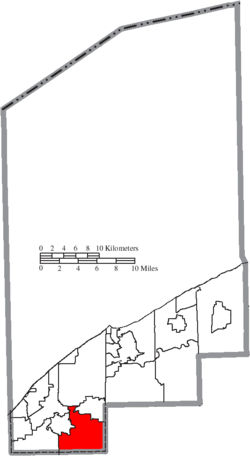Kirtland, Ohio
| Kirtland | |
|---|---|
| City | |

|
|
| Motto: "A city of Faith & Beauty" | |
 Location of Kirtland, Ohio |
|
 Location of Kirtland in Lake County |
|
| Coordinates: 41°36′9″N 81°20′41″W / 41.60250°N 81.34472°WCoordinates: 41°36′9″N 81°20′41″W / 41.60250°N 81.34472°W | |
| Country | United States |
| State | Ohio |
| County | Lake |
| Government | |
| • Mayor | Douglas E. Davidson (R) |
| Area | |
| • Total | 16.80 sq mi (43.51 km2) |
| • Land | 16.67 sq mi (43.18 km2) |
| • Water | 0.13 sq mi (0.34 km2) |
| Elevation | 850-1,163 ft (260-354 m) |
| Population (2010) | |
| • Total | 6,866 |
| • Estimate (2012) | 6,855 |
| • Density | 411.9/sq mi (159.0/km2) |
| Time zone | Eastern (EST) (UTC-5) |
| • Summer (DST) | EDT (UTC-4) |
| ZIP code | 44094 |
| Area code(s) | 440 |
| FIPS code | 39-40642 |
| GNIS feature ID | 1064951 |
| Website | http://kirtlandohio.com/ |
Kirtland is a city in Lake County, Ohio, United States. The population was 6,866 at the 2010 census. Kirtland is famous for being the early headquarters of the Latter Day Saints movement from 1831–1837 and is the site of the first Mormon temple, the Kirtland Temple, completed in 1836. The city is also the location for many parks in the Lake Metroparks system, as well as the Holden Arboretum.
After the founding of the United States, northern Ohio was designated as the Western Reserve and was sold to the Connecticut Land Company. The area was first surveyed by Moses Cleaveland and his party in 1796.
Kirtland is named for Turhand Kirtland, a principal of the Connecticut Land Company and judge in Trumbull County, the first political entity in Ohio that included Kirtland township. Kirtland, a veteran of the American Revolutionary War, demonstrated "both breadth of vision and integrity" in his fair dealings with the local Native Americans. He was known for his bravery, resourcefulness, and passion for justice. Dr. Jared Potter Kirtland was the son of the former; he helped to found a medical college in nearby Willoughby, Ohio, and he compiled the first ornithology of Ohio. The bird Kirtland's warbler is named for Jared Kirtland. This rare species has been documented in the city during migration, but it does not nest in Ohio.
Being less well suited to agriculture, the densely forested, clay soiled, high, hilly, land of Kirtland was settled later than surrounding townships: Mentor in 1798, and Chester in 1802. Kirtland's first European settlers were the John Moore family, soon followed by the Crary family who came to Kirtland in 1811. In 1893 Christopher Crary wrote a memoir of his Kirtland life, which provided a great deal of material for Anne B. Prusha's 1982 history of Kirtland.
...
Wikipedia
